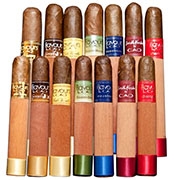- The Best Time of Day to Drink Bone Broth to Maximize Health Benefits
- 8 Ways to Increase Dopamine Naturally
- 7 Best Breads for Maintaining Stable Blood Sugar
- Gelatin vs. Collagen: Which is Best for Skin, Nails, and Joints?
- The Long-Term Effects of Daily Turmeric Supplements on Liver Health
- Could Your Grocery Store Meat Be Causing Recurring UTIs?
- Are You Making This Expensive Thermostat Error This Winter?
- Recognizing the Signs of Hypothyroidism
- 10 Strategies to Overcome Insomnia
- Could Artificial Sweeteners Be Aging the Brain Faster?
Little Cigars Liked by Teens Are Still ‘Candy-Flavored Tobacco’: Report


Scientists report that the flavored “little cigars” popular among American teens are essentially “candy-flavored tobacco.”
The finding could be important to U.S. health officials, who are concerned that those sweet flavors mask the bitter taste of tobacco, and may lure young people into a highly addictive habit that carries great health risks.
In an analysis, published as a research letter in the May 7 online issue of the New England Journal of Medicine, researchers from Portland State University in Oregon compared the chemical flavorings, and levels of those flavorings, in candy, Kool-Aid and flavored tobacco products.
The investigators found there was a lot of overlap in the kinds of flavorings used in all three products, and that some of the tobacco products had much higher levels of flavorings than the candies or Kool-Aid did.
“The same, familiar, chemical-specific flavor sensory cues that are associated with fruit flavors in popular candy and drink products are being exploited in the engineered designs of flavored tobacco products,” the researchers wrote in their letter. “What we are seeing is truly candy-flavored tobacco.”
More than two out of every five teen smokers already use these flavored products, according to an October 2013 report from the U.S. Centers for Disease Control and Prevention. And nearly 60 percent of those smoking these little cigars have no desire to quit, compared to 49 percent of other cigar smokers, the CDC noted.
Although the sale of flavored cigarettes has been banned in the United States since 2009, tobacco companies have sidestepped the ban by producing these little cigars, which weigh slightly more than cigarettes and so avoid regulation. Cigars are not currently regulated by the U.S. Food and Drug Administration.
When the CDC report was first released back in October, agency officials warned of the health dangers inherent in these products.
“Flavored or not, cigars cause cancer, heart disease, lung disease and many other health problems. Flavored little cigars appeal to youth and the use of these tobacco products may lead to disfigurement, disability and premature death,” CDC director Dr. Tom Frieden said in an agency news release at the time. “We need to take comprehensive steps to reduce all tobacco use for all of our youth.”
Another CDC official put it this way:
“Many little cigars bear a remarkable resemblance to cigarettes. In fact, some youth who are smoking cigarettes may be smoking flavored little cigars that they’ve mistaken for cigarettes,” said Dr. Tim McAfee, director of the CDC’s Office on Smoking and Health. “The concern it raises for us is because little cigars are so similar to cigarettes, this represents a loophole in the FDA’s ban on flavored cigarettes.”
Little cigars have become more popular in recent years, according to the CDC. Sales increased 240 percent from 1997 to 2007, with flavored brands making up almost 80 percent of the cigar market.
More information
For more about tobacco use among young people, visit the U.S. Centers for Disease Control and Prevention.
Source: HealthDay
Copyright © 2026 HealthDay. All rights reserved.










